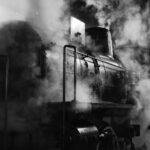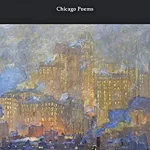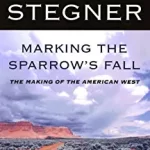I’ve just opened Wallace Stegner’s Marking the Sparrow’s Fall, a collection of essays published by Stegner’s son after the author’s death. It’s been on my bookshelf for a long time, but never picked up for unknown reasons. In the opening essay, “Child of the Far Frontier,” Stegner writes of the power of certain images, smells, and words to carry him back to his childhood on a Saskatchewan homestead.
“Like other Americans uncertain of who they are, I take firm hold on the certainties of where I am from.” (p. 6)
The essay expresses so eloquently my sense of myself as an American, a state of being I think we all share, whether we were born on these shores or not. We all carry the insecurity of the uprooted. For Stegner, child of homesteaders in the American West, this was especially poignant.
 For me, I was amazed that what returned upon reading the essay was—and is as I sit here—the acrid smell of hot metal, the giant blackness of steaming locomotive wheels, the screech of metal on rails. I am a child, not more than three or four, walking with my mother down a platform in a huge shed filled with locomotives. The giant wheels rose beside me, swallowing me in screeching steam, and the whistles that had come through my bedroom window all my life ricocheted off the ceiling. My parents, my sister, and I are going to see my grandfather on the Minnesota prairie, the first visit and the first train journey for my sister and me.
For me, I was amazed that what returned upon reading the essay was—and is as I sit here—the acrid smell of hot metal, the giant blackness of steaming locomotive wheels, the screech of metal on rails. I am a child, not more than three or four, walking with my mother down a platform in a huge shed filled with locomotives. The giant wheels rose beside me, swallowing me in screeching steam, and the whistles that had come through my bedroom window all my life ricocheted off the ceiling. My parents, my sister, and I are going to see my grandfather on the Minnesota prairie, the first visit and the first train journey for my sister and me.
Stegner said he was educated and shaped to be a European, but the imprinting of the western prairie was indelible. I was shaped to be an academic (and I’m not sure there is much difference), but remain at my core the child of Sandburg’s Chicago. Stegner was shaped by the vast openness of the prairie; my earliest memory is of standing in my nightie on the third-floor porch of our apartment building—an awesome height—spreading my arms in exultation at the morning breeze. Though cultural Chicago was part of my upbringing from the start, I remained an alley brat. My brother, asked to draw a picture of his childhood, drew, in black and white, the spider-web of porches and stairs that formed the backside of the buildings on our block.
The Chicago of my past throbs with noise, dirt and life. Depending of which direction the wind was blowing, you smelled the stockyards, steelmills or starch factory, and everywhere there are the whistles of trains. Rail hub of America, it is profoundly Midwestern, categorically different from its Eastern cousin, New York. And its poet is Sandburg. Here is the opening verse of “Chicago,” :
steelmills or starch factory, and everywhere there are the whistles of trains. Rail hub of America, it is profoundly Midwestern, categorically different from its Eastern cousin, New York. And its poet is Sandburg. Here is the opening verse of “Chicago,” :
Hog Butcher for the World,
Tool Maker, Stacker of Wheat
Player with Railroads and the Nation’s Freight Handler;
Stormy, husky, brawling,
City of the Big Shoulders:
The above is, perhaps, his best known verse, but the poem that has stuck with me over the years is another, which describes, in tone and rhythm as well as in words, a cultural attitude.
Phizzog*
This face you got,
This here phizzog you carry around,
You never picked it out for yourself,
at all, at all—did you?
This here phizzog—somebody handed it
to you—am it right?
Somebody said, “Here’s yours, now go see
what you can do with it.”
Somebody slipped it to you and it was like
a package marked:
“No good exchanged after being taken away”–
This face you got.
This ode to individualism lies deep in the heart of American culture and perhaps most strongly in the West, the frontier of Stegner’s childhood. Stegner himself refers to his later development as “Europeanization, deculturation, and isolation” (p.6), and Sandburg’s poetry often carries the lament of the uprooted. His Chicago was a city of new immigrants. Interestingly, Alexis de Tocqueville, looking ahead from 1850, identified individualism along with equality as uniquely American. He worried that it would result in isolation and decay into selfishness.
As a Midwesterner, I’m deeply embedded with the value of self-reliance expressed in Phizzog, but as an educated American of the Twenty-First Century, de Tocqueville’s warning echoes in my head every day. We need to look critically at this most American value, both at its greatness and its hazards. On the one hand, corporate American in the last decades has celebrated a freedom from all ethical standards in favor of individual wealth and rejected all social programs. Individualism in that culture is wealth and competition. On the other, the new far left would remove all individual responsibility for one’s fate. Individualism here looks like entitlement. Americans of all stripes need to rethink these distortions of individualism if we ever want to get out of the present logjam.
*Complete Poems, Carl Sandburg, Harcourt Brace, 1936, p. 390


Comments are closed.